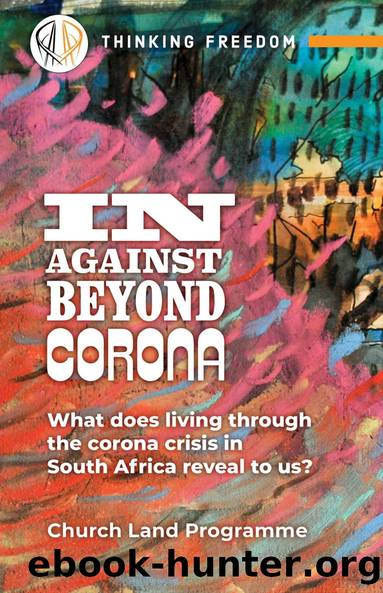in, against, beyond corona by Church Land Programme

Author:Church Land Programme [Programme, Church Land]
Language: eng
Format: epub
Published: 0101-01-01T00:00:00+00:00
[dis]connections and [un]commons
In a country like ours, the stress that the Corona crisis is placing on society can tell us something about the abiding, but also complex, ways in which our making of race and racism continues to structure our collective / shared life. It is certainly true that deep poverty and material distress continues to be mostly a black experience, and that whiteness more often than blackness correlates with privilege. But itâs also true that (a) we make and re-make race and the practices of racism, and (b) a quarter of a century after the end of the apartheid state, there are important exceptions and deviations from any crude mapping of these issues[17]. For ourselves as a society, it is important to be honest, and it is dangerous not to recognise that a crisis of the current portent really does ultimately implicate all, even if difference and inequality must also be recognised and held in critical tension.
Measures to contain and respond to the Corona crisis really only work when they are taken up as shared responsibilities by all, and for all. But our society is deeply unequal and uneven, and compliance has proven deeply unequal and uneven too. We have noted how distressing it is to see that the kind of order imposed by the state via the police and the military reveals the stateâs violent and abusive face over the people. On the other hand, many are also dismayed at the sometimes staggering displays of contempt for the measures to contain and respond to the Corona crisis, and for the logic of collective humanity and shared crisis and responsibility that informs their necessity. In the current situation, those measures that our society as a whole requires, calls on each of us to act in solidarity for the greater good.
The actions of those pockets of people[18] demonstrating varying degrees of disregard for the measures put in place for the greater good, demonstrate a distressing lack of concern for that greater good, of any real sense of connection with the broader community of humanity. Furthermore, their actions sometimes seem to be predicated on an assumed impunity for acting recklessly in self-interest. In a way this is simply one part of the value-set of the Zuma-era writ large (and hardly unique to South Africa by the wayâwitness identical patterns in spaces around the globe where populist hucksters have gained popular traction). But each placeâs version of its history and its current moment offers up the materials for constructing (false and dangerous) justificatory narratives they believe justifies their exceptionalism â their belief that the rules either donât apply to them or are being imposed on them because of some fundamental unfairness or evil. These narratives of exceptionalism routinely tell of perpetual victimhood at the hands of variously constructed âothersâ. These âothersâ are then routinely cast or imagined as enjoying some idyllic life of mastery and untrammeled power, unrestrained consumption and freedom, while conspiring to deny their servile victims that imagined idyllic life of untrammeled personal or communal power, unrestrained consumption and âfreedomâ.
Download
This site does not store any files on its server. We only index and link to content provided by other sites. Please contact the content providers to delete copyright contents if any and email us, we'll remove relevant links or contents immediately.
| Anthropology | Archaeology |
| Philosophy | Politics & Government |
| Social Sciences | Sociology |
| Women's Studies |
The Secret History by Donna Tartt(19090)
The Social Justice Warrior Handbook by Lisa De Pasquale(12190)
Thirteen Reasons Why by Jay Asher(8912)
This Is How You Lose Her by Junot Diaz(6887)
Weapons of Math Destruction by Cathy O'Neil(6281)
Zero to One by Peter Thiel(5802)
Beartown by Fredrik Backman(5755)
The Myth of the Strong Leader by Archie Brown(5508)
The Fire Next Time by James Baldwin(5446)
How Democracies Die by Steven Levitsky & Daniel Ziblatt(5219)
Promise Me, Dad by Joe Biden(5153)
Stone's Rules by Roger Stone(5088)
A Higher Loyalty: Truth, Lies, and Leadership by James Comey(4964)
100 Deadly Skills by Clint Emerson(4926)
Rise and Kill First by Ronen Bergman(4789)
Secrecy World by Jake Bernstein(4753)
The David Icke Guide to the Global Conspiracy (and how to end it) by David Icke(4720)
The Farm by Tom Rob Smith(4514)
The Doomsday Machine by Daniel Ellsberg(4490)
